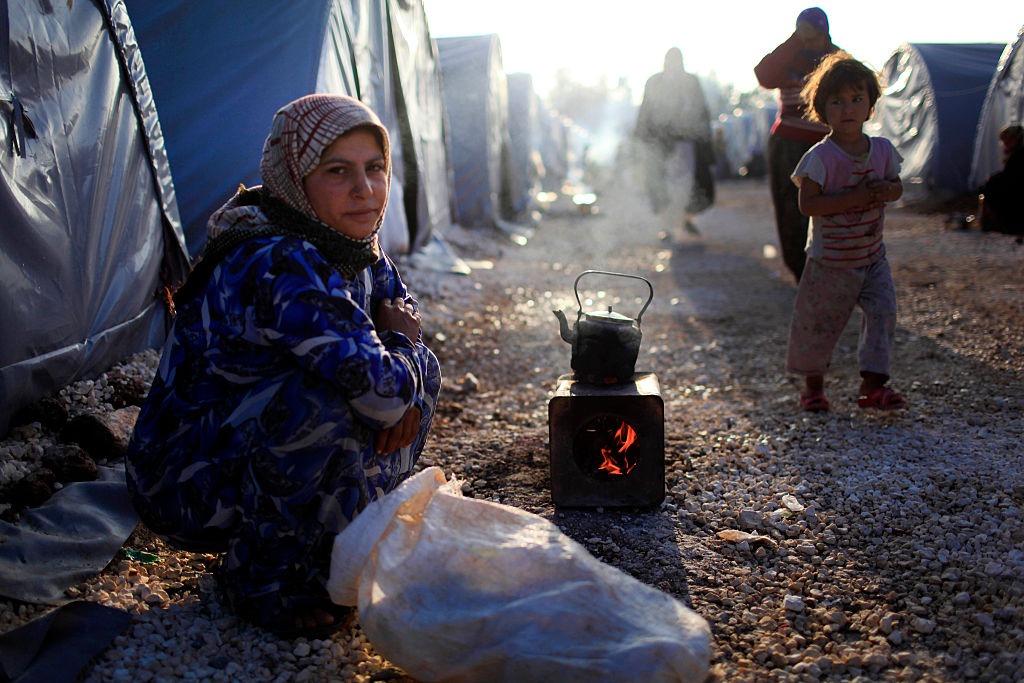According to a famous proverb, the Kurds, repeatedly abandoned by Western allies, have “no friends but the mountains”. But in northern Syria, the Kurds don’t even have mountains to fall back on. The border between Turkey and Syria, east of the river Euphrates, runs along the rusting tracks of Kaiser Wilhelm’s long-abandoned Berlin to Baghdad railway. On either side of this arbitrary dividing line, the level, arid steppe provides no sheltering ground for defence or insurgency. For the Syrian Kurdish city of Kobane, directly on the border, the prospects of fending off a Turkish invasion without Western intervention are exceedingly grim.
A decade ago, America’s intervention in the celebrated siege of Kobane in northern Syria turned the tide for the Kurdish YPG defenders, not only saving the city from Islamic State conquest but establishing a working relationship that saw the jihadist group almost completely extinguished in the country. Yet Trump’s impulsive 2019 decision to withdraw US troops from along the border saw the Autonomous Administration of Northeast Syria (AANES) collapse, despite hard fighting, in the face of invasion by Turkish-backed Syrian National Army (SNA) militias, losing precious ground and precipitating the ethnic cleansing of thousands of Kurds from the ethnically mixed region. The situation today, for the entirely Kurdish city of Kobane, is even more perilous.
Following the fall of Manbij earlier this month, Kobane is now pressed on its western flank along the Euphrates by the SNA, with the Syrian Democratic Forces (SDF) putting up a dogged defence for the vital Karakozaq bridge. East of Kobane, SNA forces are massing in the territories captured by Turkey in 2019; north of the city, the Turkish army overlooking the city is pounding the SDF with artillery and drone strikes. American attempts to broker a last-minute peace deal have failed; European diplomacy, perhaps indistinguishable from bribery, is ongoing.
While the city’s defenders have vowed to repeat their celebrated 2014 stand, it took US intervention to save the city a decade ago — a US Air Force deus ex machina which will surely not be repeated against a purported Nato ally. In its dying days, the Biden administration is unlikely to commit the United States — which announced yesterday that it has 2000 troops in Syria, rather than the previously claimed 900 — to interposing its forces between the AANES’s SDF and the massing SNA. Trump’s disinclination to continue America’s presence in the region, and close personal relationship with Erdoğan, bode ill for the AANES.
With its US sponsor essentially a bystander, the AANES has been forced into rapid diplomacy, not only pledging fealty to the new HTS-dominated government in Damascus but offering, through the Americans, to withdraw its troops from the city, leaving only its Asayish police militia, and to evacuate non-Syrian Kurdish fighters from the country, a longstanding Turkish demand. At the same time, the AANES is slowly handing over ethnic Arab territories such as Deir ez-Zur and Raqqa, won in the long war against Islamic State, to HTS control, in a process likely to accelerate in the coming weeks. Kurdish domination of Arab regions, in this ethnically divided region, was a longstanding complaint of both Turkey and Western advocates for the militias Ankara controls.
Ironically, the very creation of the SDF, in which the Kurdish YPG provided the core of an assemblage of Arab and Christian militia forces, was largely the product of American attempts to assuage such Turkish complaints. Yet, instead, even as the Kurds divest themselves of their Arab holdings, they are now also threatened with ethnic cleansing in their own core territories.
With nowhere else to go — apart from a Europe increasingly disinclined to welcome Syrian refugees — the looming crisis is increasingly an existential one for Syria’s Kurds. A few short years ago, Western support proved a vast force multiplier for the SDF. Now its withdrawal, and the militia’s looming destruction at the hands of a Nato country, may prove fatal. The Kurds are not the first, and will not be the last, to learn that it is a hard thing to be America’s partner in a war lasting longer than a Washington electoral cycle.











Join the discussion
Join like minded readers that support our journalism by becoming a paid subscriber
To join the discussion in the comments, become a paid subscriber.
Join like minded readers that support our journalism, read unlimited articles and enjoy other subscriber-only benefits.
Subscribe